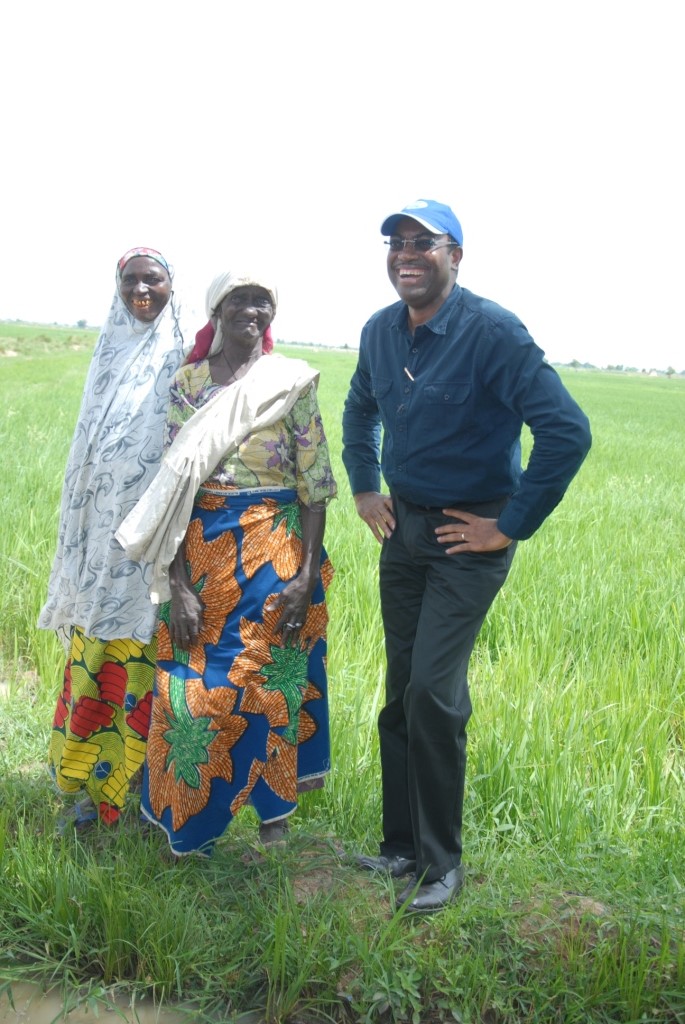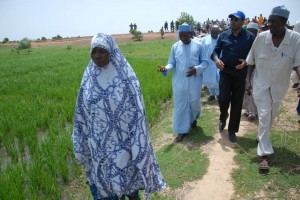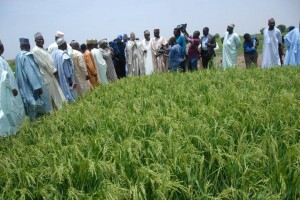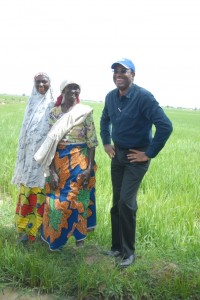


“I may be wrong, and, sometimes I am; but the thoughts are always my own”. The foregoing words belong to Dele Sobowale, writer, columnist, publisher and as recently revealed, “… an expert on rice production in all its aspects – from farm to table”.
Mr. Sobowale recently caused to be published in his Vanguard newspaper column, an article titled: “Minister of Agriculture in Fantasy land”. The title caught my fancy and, I am sure, that of not a few Nigerians. But I more. And you ask why? Well, because I have dedicated nine out of the last ten years to non-stop agro-centric journalism. On this watch, I have seen three ministers of Agriculture, with Adesina being the fourth.
In these nine years, my emotions have gone from despair to hope and, in recent time, sheer gratitude. And when I talk about gratitude, it’s towards God – for whom Mr. Sobowale would want us to understand he made a road trip from Lagos to Sokoto recently. This piece will not set out to appraise Mr. Sobowale’s religiosity or otherwise. Instead, the focus will remain on the substance of his write-up, which appears to be the first part of a series. To my mind, Sobowale’s piece best qualifies as a diatribe laced in outmoded subversive logic, which, despite its veiled claim to objectivity, is resplendent with perfidy. The problem however is that having only recently become a septuagenarian, there is a tendency for many readers to take him seriously on the assumption that, given his age, his postulations are undoubtedly writings of a sage.
I feel very strongly about Sobowale’s piece, for the main reason that it is brazen, care-free use of a position of trust for advancing “self-serving” sentiments capable of subverting national interest. And I need emphasis that Sobowale has a history in this regard. Reading through his piece, “To my Brother Agric Minister” of April 15, 2013, it is easy to understand why he set out on this journey to Sokoto in the first place. He had criticized the Minister for supposedly “assaulting us (Nigerians) with projections about food security and superlative agricultural productivity….” Reading through the rest of the piece, one will find it best represents morbid, misleading journalism on display. But Mr. Sobowale cannot be exonerated from the crass pessimism he has displayed in his writing. By personal admission, he had stopped rice milling some 24 years ago – a good two decades and four years. But for him, this is sufficient to confer the status of an authoritative evaluator of the current rice production situation in Nigeria.
From the statements of the “expert on rice production in all its aspects – from farm to table,” clear contradictions came to light. How do we then explain his comments on the changes that have taken place in recent times? “It was clear to me,” Sobowale volunteered in his infamous write-up, “that there had been a ‘quantum jump’ in rice production in the North West generally.” The man went on, amazingly, to add that “it was even more obvious that Nigerian farmers had risen to the challenge of producing rice in large quantities.” He concluded that on, this count of increased rice production, he and the Minister were in total agreement. In one breath, Sobowale vehemently discredited the minister and his rice transformation, but, in another breath, quickly relinquishes his position, apparently inadvertently endorsing Nigeria’s new agricultural policy that has successfully triggered a sharp rise in productivity.
The rice transformation is a stark reality. Governor Usman Dakingari of Kebbi State had on this score been heard to say that “because of the rice revolution under Minister Adesina, we now count rice in kilometres in Kebbi, not in hectares”. There is no doubt that this statement stemmed from a man who has seen the impact of the Minister’s uncommon leadership in spear heading massive rice revolution across the country. Governor Wada of Kogi State on his part, had this to say, “we have turned our land into massive rice baskets by fully aligning with the agricultural transformation of the Federal Government”. Sobowale is entitled to his opinion, but if he must lecture Nigerians about his conviction, he does not need to ask Adesina about the progress being made in Nigeria’s agriculture. Let him ask the investors, the millers, the input suppliers and the farmers who benefited from the largesse that helped them to produce. Three years of painstaking overhaul of the way inputs and subsidies are channeled to small scale agricultural producers across the country have borne the desired dividends – with the farmers producing more – quite naturally. There is very little, if anything, that anyone can do to mask the change because it is glaring. He needs to speak to Alhaji Sani Dangote of Dansa Agro-Allied Products Ltd and ask him why he is investing billions of naira in profound crop plantations as well as mega processing factories.
Sani Dangote currently chairs the Nigeria Agribusiness Group, a private investor-driven interest group that has declared its unalloyed support for the present reforms in Nigeria’s agricultural sector. From him, Sobowale should be keen to know what is fuelling the unprecedented interest of billionaires in the sector and why they would unanimously openly endorse the present administration’s policy intervention.
Crusoe Osagie in his piece in ThisDay newspaper of 7th May 2014, had this to say; “acknowledging the uncommon leadership provided by the Minister of Agriculture and Rural Development, …the company (Stallion Group) said its interest in the sector and resolve to contribute to its development was helped by the enthusiasm and know-how which Adesina introduced to the sector since he became Minister”. Going further to describe the underlying motivation for the company’s investment, Osagie notes that “the challenge of milling and processing the rice paddy has taken its importance, pursuant to which the company started its commercial production (made-in Nigeria rice) from locally procured paddy by putting a state-of-the-art rice milling facility in Kano”. Stallion Group, like the many other local rice investors, saw an opportunity based on the resolve of the Federal Government to ensure that Nigeria’s rice industry is protected from unfair competition. That is why, according to Osagie, the Group is “now operating a fully integrated state-of-the mill in the country with an aggregate capacity of 360,000 metric tons per annum and is producing a premium variety of rice from local paddy being marketed by the company under the names ‘Royal Stallion Shinkafa’ and ‘Super Champion’ which are now the most popular locally produced made-in-Nigeria brands of rice”. But like I said, Stallion is not the only one. Sobowale can go to Kano and talk to UMZA rice; Makurdi, and talk to Mikap rice; or to Ebony rice in Ebonyi State; or even to Nassarawa State to talk to Olam. I will particularly prefer he begins with Olam, which has an expansive farm in Doma local government area of Nassarawa State. They are committing thousands of hectares of farmland to rice cultivation, while also building a state-of-the-art mill that is near completion.
Indeed, so good is the local rice being milled in Nigeria today, that the old concept of “local rice’ being one with stones and poor grain quality has been totally turned around by this Minister. That consumers buy Stallion’s locally milled rice from rice paddy produced in Nigeria and think it is imported rice, is an unmistakeable work of the enormous success of Minister Adesina’s sound policies on rice which has now shifted majority of rice farmers to the high quality varieties – with long grain characteristics – preferred by the integrated rice mills.
In acknowledging the change and subsequently turning around to malign the minister, Sobowale has betrayed the fact that he is frustrated by his inability to have succeeded in his own time. On account of his claims at expertise in rice, I looked up Minister Adesina’s pedigree and was pleasantly surprised to discover that he is a globally respected consummate expert on rice, having been the principal economist for the West Africa Rice Development Association (now Africa Rice Center) from 1990 – 1995. Interestingly, he (Adesina) was part of the team that helped to develop NERICA rice, the new high yielding rice type now driving the rice revolution in Nigeria. In fact, with his understanding of the importance of high yielding varieties and fertilisers to increased productivity, the Minister had begun 2 years ago, a policy of massive distribution of these high yielding varieties to farmers.
Thus, through massive public-private partnership with local seed companies and the Africa Rice Center, the Minister launched free distribution of Faro44 and Faro52 varieties to rice farmers across the country. Buoyed also by the Federal Government’s subsidy of 3 bags of fertiliser per farmer, rice farmers began a massive shift to these new high yielding varieties. My investigation reveals that last year, a near 2 million farmers had adopted these new varieties, little wonder that average yields have exponentially increased from 1.5 to 5 tons per hectare.
Sobowale is clearly out of touch with reality. The rice industry has been transformed productively and he cannot recognize it anymore. It is a far cry from where he left it 24 years ago. But rather than admit same and keep quiet, he chooses to put pen to paper and by so doing, has only succeeded in revealing his ignorance. He has forgotten through “selective dementia”, the fact that President Jonathan had launched a National Dry Season Farming Policy – the first ever in the country – which now makes it possible for farmers to produce rice in both the wet and dry seasons. It is this double cropping window that has led to the unprecedented spike in paddy rice production. When Adesina talks about increase, it’s not just empty talk. Thus, while armchair skeptics like Sobowale criticise in the city, the reality in the rural areas point to a dramatic production revolution. Apparently, it is not Adesina who is living in fantasy land but Sobowale who has taken up permanent abode in a world of self-imposed delusion.
The real need lies in milling and that is being turned into an opportunity. Here again, the impressive rise in the number of integrated rice mills across the country is indicative of progress – reports have it that up to 15 new integrated rice mills have been established. Small scale rice mills are also springing up, buying and milling local paddy and competing fiercely with the integrated mills for raw material. Sobowale can be pardoned for his age, but if he were to travel to the Abakiliki area, he’d see the 4,500 small scale mills maintaining a boisterous rice milling business and creating jobs.
My first encounter with positive figures about Nigerian agriculture was not in Nigeria but in Darkar, Senegal, at the 2012 edition of the Africa Agribusiness Forum. Nor was it a Nigerian official talking about it. Moussa Seck of the Pan African Agribusiness and Agro-Industry Consortium (PanAAC), himself a renowned expert of agricultural planning who is credited with laying the foundation for Senegal’s National Agricultural Policy, shocked everyone at the event (both foreigners and Africans alike) with the result of an independent survey of food production in Africa. “Nigeria”, said he “has overtaken Egypt as the largest food producer in Africa”. That was two years ago!
It becomes easy to see why I feel a sense of compulsion to respond to Sobowale. I hope the Federal Ministry of Agriculture and Rural Development gets to publish the detailed figures of rice production across the country in the past two years, if not for any other reason, to reinforce the fact that Dele Sobowale and others who criticize such laudable efforts should hide their heads in shame.!!!
Writers owe their readers a deep sense of responsibility not to localise problems that have international dimensions. Rice as food has influence spanning beyond a single country. As I write, Thailand, the number one exporter of rice, is experiencing an interregnum, deeply rooted in food crisis. Imagine if Adesina had not fought to get Nigerian rice farmers to produce more! Wouldn’t Nigeria’s economy have been used as a veritable means of cushioning the effect of that nation’s recession? But Sobowale cannot see that dimension, either because he is ignorant or actuated by mischief. For him, imported rice needs to be allowed free course into our market so that ‘Nigerians will be appropriately fed’. Such logic stemming from an ‘Expert’ in rice production!
So who is living in fantasy land? Our ‘Expert’ simply cannot understand why this hard working Minister is succeeding. That is why while rice farmers as well as small and large scale rice millers celebrate and praise the unprecedented rice revolution ongoing in Nigeria, Sobowale contents himself with simply venting resentments towards the ‘farmers’ Minister” for his audacious success, where he had failed 24 years earlier.









